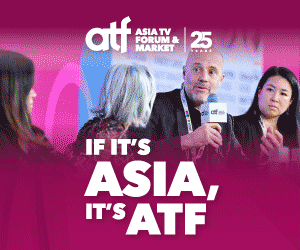
Emerging markets streaming platform iflix has just done two telco deals in Southeast Asia that could make a life/death difference.
“This is a massive milestone for us, an enormous step forward,” iflix chief executive Mark Britt said a few minutes after new alliances with Telkomsel in Indonesia and Globe Telecom in the Philippines were announced on 15 November. He would, of course, say that, after at least three years of putting a brave face on negotiations that never seemed to go anywhere.
“These partnerships unlock a huge growth opportunity for iflix, giving us access to 230 million consumers previously out of reach. They represent years of hard work, long nights, exciting discussions and tough negotiations on both sides of the fence. For us, they are the new standard of commitment, where you will see us collaborating broadly and deeply across all areas of our business from content creation, feature and app innovation to data bundling,” Britt said.
Other than some deserved headlines mashed into ongoing fund raising rounds, what do the new deals really mean – and why now?
First, a bit of background. Telkomsel and Globe are both affiliated with Singapore telco giant, Singtel, which has a 65% stake in Hooq along with increasingly silent JV partners, Sony Pictures Television and Warner Bros. Hooq is probably iflix’s fiercest rival in Southeast Asia, although there’s no shortage of competition. We’ve seen no proof that the Singtel factor gave Hooq an advantage, but Britt certainly thinks iflix was disadvantaged in the Hooq vs iflix battle.
That’s all over now. iflix’s new deal with Telkomsel breaches Hooq’s Indonesian stronghold, leveling the playing field and allowing iflix to go head to head with Hooq for the first time via the country’s dominant operator. Guesstimates are that at least 70% of Hooq’s users in Indonesia come from Telkomsel. iflix users have been spread across telcos, with the bulk coming from Indosat and XL and a small percentage from Telkomsel users subscribing to iflix independently. Ditto with Globe in the Philippines, another fierce battleground for the two streamers.
What caused Telkomsel and Globe to change their minds about iflix now? For one, the price was likely to be right. iflix...
Emerging markets streaming platform iflix has just done two telco deals in Southeast Asia that could make a life/death difference.
“This is a massive milestone for us, an enormous step forward,” iflix chief executive Mark Britt said a few minutes after new alliances with Telkomsel in Indonesia and Globe Telecom in the Philippines were announced on 15 November. He would, of course, say that, after at least three years of putting a brave face on negotiations that never seemed to go anywhere.
“These partnerships unlock a huge growth opportunity for iflix, giving us access to 230 million consumers previously out of reach. They represent years of hard work, long nights, exciting discussions and tough negotiations on both sides of the fence. For us, they are the new standard of commitment, where you will see us collaborating broadly and deeply across all areas of our business from content creation, feature and app innovation to data bundling,” Britt said.
Other than some deserved headlines mashed into ongoing fund raising rounds, what do the new deals really mean – and why now?
First, a bit of background. Telkomsel and Globe are both affiliated with Singapore telco giant, Singtel, which has a 65% stake in Hooq along with increasingly silent JV partners, Sony Pictures Television and Warner Bros. Hooq is probably iflix’s fiercest rival in Southeast Asia, although there’s no shortage of competition. We’ve seen no proof that the Singtel factor gave Hooq an advantage, but Britt certainly thinks iflix was disadvantaged in the Hooq vs iflix battle.
That’s all over now. iflix’s new deal with Telkomsel breaches Hooq’s Indonesian stronghold, leveling the playing field and allowing iflix to go head to head with Hooq for the first time via the country’s dominant operator. Guesstimates are that at least 70% of Hooq’s users in Indonesia come from Telkomsel. iflix users have been spread across telcos, with the bulk coming from Indosat and XL and a small percentage from Telkomsel users subscribing to iflix independently. Ditto with Globe in the Philippines, another fierce battleground for the two streamers.
What caused Telkomsel and Globe to change their minds about iflix now? For one, the price was likely to be right. iflix in the past is believed to have undercut the market in a big way, offering deals some say were up to 90% lower than Hooq’s. Neither have disclosed deal terms, in Indonesia or anywhere else.
In addition, political and corporate winds are clearly blowing in iflix’s favour, and the forces that might have driven support for Hooq over iflix are spent. Both Telkomsel and Globe are building big, beautiful and total experiences for their millions of telco subscribers. And both have – clearly – now said iflix needs to be a part of the plan. Any objections, from shareholder Singtel or anyone else? No? Right, let’s get on with the business of streaming then.
In Indonesia, Telkomsel says its customers use about 70% of their data quotas for video streaming. In the past year, video content traffic on the network has increased by 250%. “This is just the beginning,” says Crispin Tristram, Telkomsel’s head of digital lifestyle services.
iflix’s multi-phase partnership with Telkomsel includes integrated carrier billing, with daily pricing of Rp1,300/US$0.09. The monthly iflixVIP plan costs Rs39,000/US$2.67. iflix testing on Telkomsel in the two weeks before the official announcement added about 300,000 active users, bringing iflix’s total across Indonesia’s four telcos at about four million.
The Indonesia deal follows iflix’s blossoming relationship with Globe Telecom. The Globe deal covers distribution/carrier billing, coproduction with Globe Studios and content licensing of Globe Studios titles, including music show Elements: The Series.
The content piece is part of bigger picture Globe president/CEO Ernest Cu is drawing. Only weeks before, Cu called for more local Philippines’ content on OTT streaming services. “The content we see today has to be made more appealing to a wider audience,” Cu said. “We are working very very hard to fill the OTT world with Filipino content. Today we’re reaching the A-crowd, the post-paid crowd, the Netflix crowd, the Disney crowd… there is not enough Filipino content on those platforms,” he said.
The big question now is how these 230 million potential new customers will engage with iflix, which has always offered some Indonesian titles, including Joko Anwar’s 2017 horror film, Pengabdi Setan (Satan’s Slaves). New flagship titles are Magic Hour 2 and Conversations with Ghosts. At least six original series out of Indonesia are in development, and iflix is planning to release an exclusive movie a week – post-theatrical titles and streaming originals – over the next 12 months. Is that enough? No way to know. But for sure it’s a start.
Published in Issue Seven of ContentAsia's in-print + online 2018 (December 2018)



















